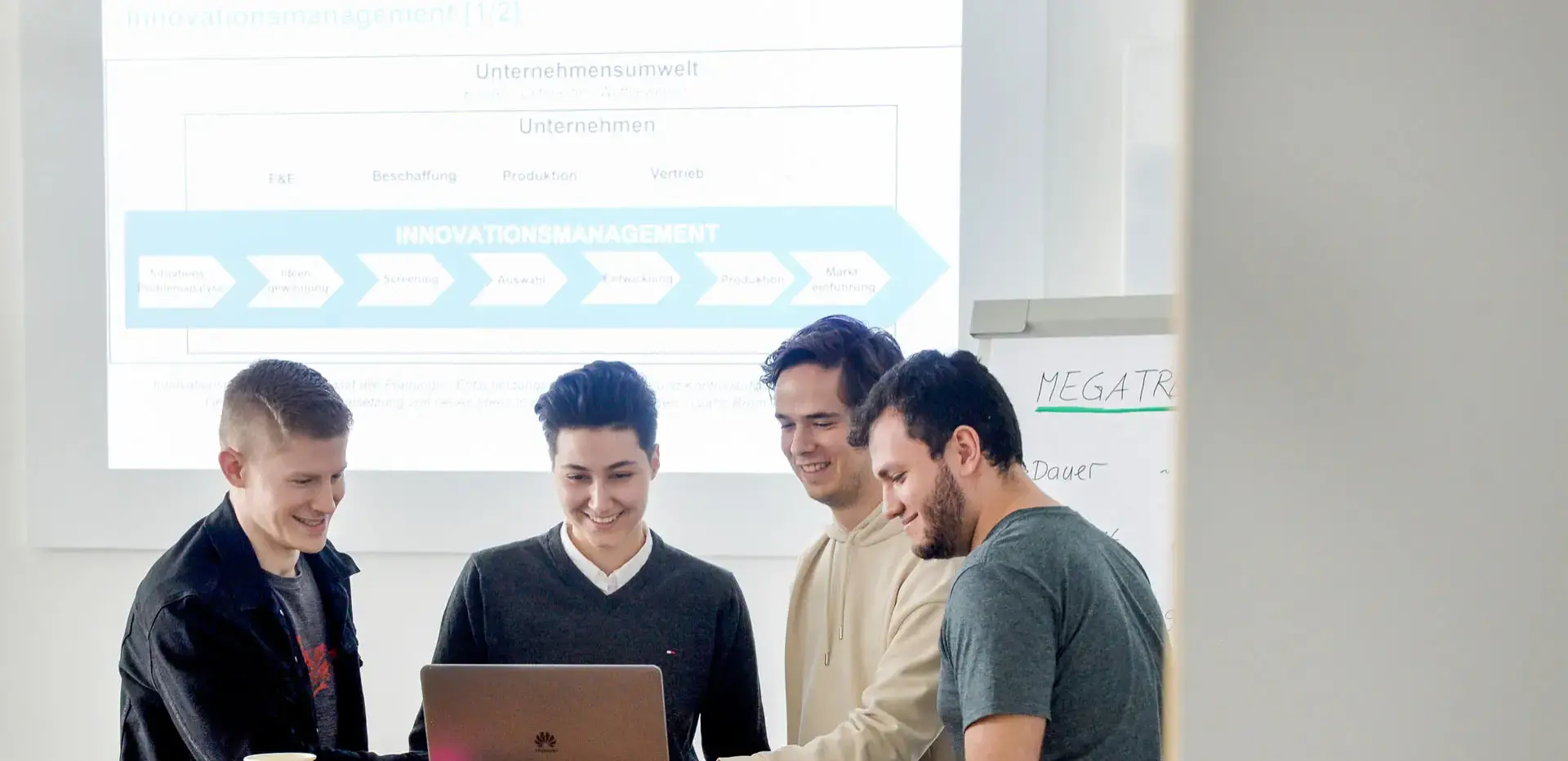Informatics and Business M.Sc.
Hagen

Master programme Informatics and Business M.Sc.
What? Gain knowledge in computer science and business administration at an international level.
For whom? For anyone with an analytical and business mindset who wants to expand their soft skills and conceptual abilities.
Why? Specialisation in "ERP and Analytical Systems" and "IT Quality Management" possible
On this page
Application for Winter Semester: Beginning of March to 15 July (Non-EU students) or Mid-May to 31 August (EU students). Application for Summer Semester: Beginning of November to 15 January (Non-EU students) or Beginning of December to End of February (EU students).
Requirements: Admission-free
This study programme has no admission restriction. Certain requirements must be met.
More info on the RequirementsDegree
Master of Science (M.Sc.)
90 ECTS
Type of study
Full-time study
General information on the study modelsBeginning/Duration of course
Beginning: Winter and Summer Semester
Standard Period of Study: 3 Semesters / 1.5 Years
Contributions and Fees
Language of instruction
English
(only some elective subjects are offered in German)
Before starting your Studies -
Requirements & Application Procedure
Requirements
The degree programme is NC-free, which means that there are no admission restrictions. Only the following points need to be proven*:
A successfully completed Bachelor's degree with a minimum of 210 ECTS in the following fields:- a) Bachelor's degree program in Business Administration (Betriebswirtschaftslehre) or International Business Administration at the South Westphalia University of Applied Sciences
- b) Bachelor's degree program in Business Information Systems (Wirtschaftsinformatik)
- c) Bachelor's degree course in Computer Science with at least 20 ECTS points on business administration content
- d) Bachelor's degree program in industrial engineering (Wirtschaftsingenieurwesen) with at least 20 ECTS credits in computer science content
- e) Bachelor's degree program that covers a spectrum of subjects including business administration, computer science, and cross-sectional subjects (such as mathematics, statistics, languages, and social skills).
Non-EU applicants who apply via Uni-Assist need to upload this questionnaire by the application deadline.
Language Proficiency: With your application, you must provide proof of English language skills with a language certificate (for example TOEFL 78 iBT, Cambridge, or IELTS 5.5) at least at level B2 of the Common European Framework of Reference for Languages (CEFR). Only for applicants who have acquired their study qualification in Australia, Ireland, Canada, New Zealand, the United Kingdom, and the United States of America, proof of English language proficiency is deemed to have been provided. Please note that German language skills and/or language tests are not required for this course.
Proof of ability: the ability for the master course is considered as adduced if the applicant has completed the previously mentioned course of study (bachelor or diploma) with a result comparable to the German 2,0 or up to 2,5 if the final Bachelor Thesis is better than 1,7.
*Only the information in the respective valid examination regulations is legally binding.
Application and Enrolment
Application for Winter Semester: Beginning of March to 15 July (Non-EU students) or Mid-May to 31 August (EU students). Application for Summer Semester: Beginning of November to 15 January (Non-EU students) or Beginning of December to End of February (EU students).
(Attention: Applications are only possible within the respective application period!)
When applying for the Master’s study program Informatics and Business, please make sure to choose the suitable application procedure for you. Applicants from Germany and the EU countries (including Iceland, Liechtenstein, and Norway) should apply via the university portal. Applicants from Non-EU countries should apply via uni-assist. It is also mandatory to upload this questionnaire to Uni-Assist within the application deadline.
Here you can find further information on the Application Procedures
Who is the study course Informatics and Business aimed at?
The digitalisation and networking of operational processes from product development to logistics and intelligent production according to Industry 4.0 concepts are current challenges in industry. The high degree of complexity requires sound knowledge in computer science and in the field of business administration. This is where our 3-semester Master's degree Informatics and Business comes into play. Beside the theoretical and practical specialisation in the two core areas "ERP and Analytical Systems" and "IT Quality Management", the course imparts knowledge in SAP®, software engineering, IT auditing, information management and data science at an international level.
Students of our Master's course in Informatics and Business have the know-how for the major topics such as software quality, enterprise resource planning, the Internet of Things, artificial intelligence, Industry 4.0 or autonomous mobility. Students are provided with a well-prepared toolbox creating the important practical reference, which is why the "contact to professional practice" can always be found in the modules of the study course. The study course enables solution-oriented work from the first semester onwards, among other things, on real practice-oriented issues in industry. Our international student teams do not only design application-oriented solutions for tomorrow, but they also acquire important soft skills: open communication, curiosity for different tasks and new challenges, the ability to work in a team in an intercultural environment, skills in agile project management and much more.
Target group
Do you have an analytical and economic mindset? Do you want to expand your soft skills and conceptual abilities? The Informatics and Business degree programme aims to train you as an information technology all-rounder with sound business application knowledge.
A Master's degree is not enough for you? Due to the programme planning, it is efficiently possible to acquire the degree in Business Administration and Engineering M.Sc. in parallel. As a prerequisite, the entrance-eligible Bachelor's degree must include at least 10 credit points from the field of engineering sciences.
What career prospects does the Informatics and Business study programme offer?
The real and virtual world, industry and information technology are increasingly growing closer together. "Industry 4.0" and "digitalisation" are no longer just trendy words, they accompany us every day in our daily lives. They constitute new challenges for business informatics professionals and industrial engineers, but also for industry. Modern enterprises need increasingly more specialists who work at the interface between business, information technology and engineering. The perspectives and fields of application of our Master's degree are diverse, our students work conceptually and implementation-oriented. They develop, install and model technical systems for the optimisation and control of complex industrial plants or within ERP systems such as SAP. Our students work on "Industry 4.0" processes, especially in mechanical and plant engineering, the automotive industry, electrical engineering, the ITC industry or the chemical industry. The career prospects with this qualification are and will remain excellent in the future, because increasingly complex technologies, products and processes are being developed that will require these skills in the future and in the long term.
Dr. Kathrin Maassen (studied Business Administration and Engineering (B.Sc.) from 2009 - 2012)

The international orientation of my study program was an advantage in 2009 and one of the reasons why I chose the Fachhochschule Südwestfalen as my place of study. In retrospect, mandatory language courses and the participation in an international excursion made it easier for me to start my future career. Therefore, I’m pleased that the Fachhochschule Südwestfalen is expanding its range of courses in a forward-looking way by including master programs in English like Business and Informatics.
How is the study course Informatics and Business structured?
The study course Informatics and Business is very diverse and offers individual opportunities for competence building with regard to the two core areas of ERP and Analytical Systems as well as IT Quality Management.
Core area: ERP and Analytical Systems
To become leaders in the technological and digital transformation, enterprises need to increase their performance, efficiency and customer loyalty. This can be obtained through the strategic use and analysis of data and the use of integrated ERP landscapes. The ever-increasing amounts of data and the requirements of Industry 4.0 require both the handling and understanding of data processing within common ERP software as well as the development of analytical knowledge with regard to methods in the present situation.
The core area "ERP and Analytical Systems" covers an introduction to Industry 4.0 concepts and the application of practical case studies on networking and scenarios in intelligent factories as well as various quantitative methods such as predictive data mining, simulation and optimisation. Moreover, students acquire important standards of ERP systems based on SAP as well as business structures, functionalities and interrelationships of integrated information systems. Our students deepen their professional and methodological competencies especially in the areas of data analysis, modelling and forecasting with a focus on enterprise resource planning and advanced analysis methods such as classification, segmentation and clustering. Consequently, our students are ideally prepared to work in a wide variety of organisational units in enterprises after graduation by specifically analysing the data available today and, based on this, creating forecasts in order to design operational or entrepreneurial processes more efficiently.
Core area: IT Quality Management
In today's globalised economy, enterprises cannot afford any deficits in their quality standards due to the ever-increasing competition. They must also strive for continuous improvements in the area of software quality management in order to remain successful in competition. Therefore, it is no longer sufficient to be able to develop software. The software's quality must also meet the requirements in order to be successful on the market. To develop good software, one has to understand what software quality actually is, how it is created, measured and maintained. Our students can develop new IT systems quality-consciously and implement their ideas creatively and according to high standards. In the core area "IT Quality Management", our students learn comprehensively about the process of quality-controlled software development. In addition, they learn to understand and master the interaction of the components of complex IT systems. The special focus is on quality, security and usability. For this purpose, tools of Design Thinking, Test Driven Development and Requirement Engineering are applied, among others.
Curriculum Informatics & Business M.Sc.*
| Compulsory modules The compulsory modules comprise both core modules of the respective focus and comprehensive modules such as Information Management and Cross Culture Management and Business Ethics. The following courses, among others, are offered in the core areas: | Compulsory electives A Here, modules are offered from the core area that was not selected. | Compulsory electives B | Compulsory electives C | |
|---|---|---|---|---|
| Core area ERP and Analytical Systems | Internship ERP-Systems, Smart Factories: SAP Leonardo for Industry 4.0, Advanced Analytics, Enhancement and configuration of ERP systems, Information Management, Cross Culture Management and Business Ethics, Master's thesis, Colloquium | Choice of modules from the core area IT Quality Management | Choice of modules from the core areas Production Technology or Information Engineering | Choice of modules from the core area Management Skills |
| Core area IT Quality Management | IT Quality Management, Requirements Engineering and Test Driven Development, IT Quality Controlling, Design Thinking, Information Management, Cross Culture Management and Business Ethics, Master's thesis, Colloquium | Choice of modules from the core area ERP and Analytical Systems | Choice of modules from the core areas Production Technology or Information Engineering | Choice of modules from the core area Management Skills |
| *Only the information in the respective valid examination regulations is legally binding. | ||||

